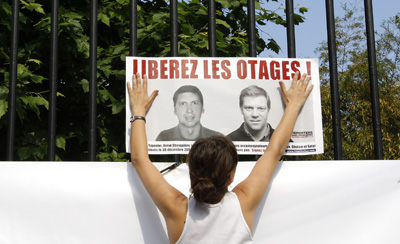On December 29, 2009, Stéphane Taponier and Hervé Ghesquière, two seasoned reporters with the French public service TV channel France 3, and their three Afghan assistants, were taken hostage in Afghanistan. One year later, a sense of cautious optimism seems to prevail in Paris. On December 20, French authorities announced that they had received a video showing the hostages “in good health” although “they appear weakened by the detention.” According to Paul Nahon, director of France 3, the video–which was not publicly broadcast–was shot “around November 20.”
The director of France Télévisions, Remy Pflimlin, expressed “cautious optimism,” insisting that the video proves that “negotiations led by state services on the ground and with very important means are continuing.” Foreign Minister Michèle Alliot-Marie emphasized the efforts of the Afghan government and declared her hope that its initiatives, among others, will lead to “the prompt liberation of the hostages.”
According to unconfirmed reports, the hostage-takers are asking for the liberation of two Taliban prisoners held by the Afghan government, but the French authorities have denied any knowledge of such a barter deal.
While press freedom groups welcomed the news that the hostages were alive, some denounced the release of the video as “blackmail” and criticized the slow pace of the negotiations. But after the confusion and controversies that followed the abduction there is no place for polemics. All the major actors in the drama–the French authorities, France Télévisions, journalists’ organizations, and a support committee formed by friends and relatives–appear to be on the same page and working in unison.
While negotiations are proceeding in total secrecy, the public mobilization for Taponier and Ghesquière has been sustained. Every day on French public channels their names are mentioned at the end of all major news programs, with the same sentence: “And we have not forgotten our colleagues Stéphane and Hervé …” followed by the number of days of their captivity.
Solidarity gatherings have been held in French cities, with the support of leading media personalities and former French hostages like Florence Aubenas. Taponier and Ghesquière’s photos hang on huge banners displayed on the walls of France Télévisions’ headquarters and on French municipal buildings.
With the anniversary of their kidnapping approaching, the support committee, press freedom groups, and media organizations are shifting into high gear. On December 6, the association of Paris-based foreign correspondents–Association de la presse internationale (API) — awarded its Grand Prix Spécial de la Presse Internationale to the two journalists in honor of their “contribution to international news reporting.” Groups are planning a series of events on December 29 with the support of major news organizations. A rally and a vigil will take place in front of the Paris town hall with media personalities and members of the hostages’ family.
The abduction of Taponier, Ghesquière, and their three Afghan colleagues is one of the longest in the history of French journalism in decades. In the coming days their colleagues and friends will redouble their efforts so that, indeed, it will not be the longest.
